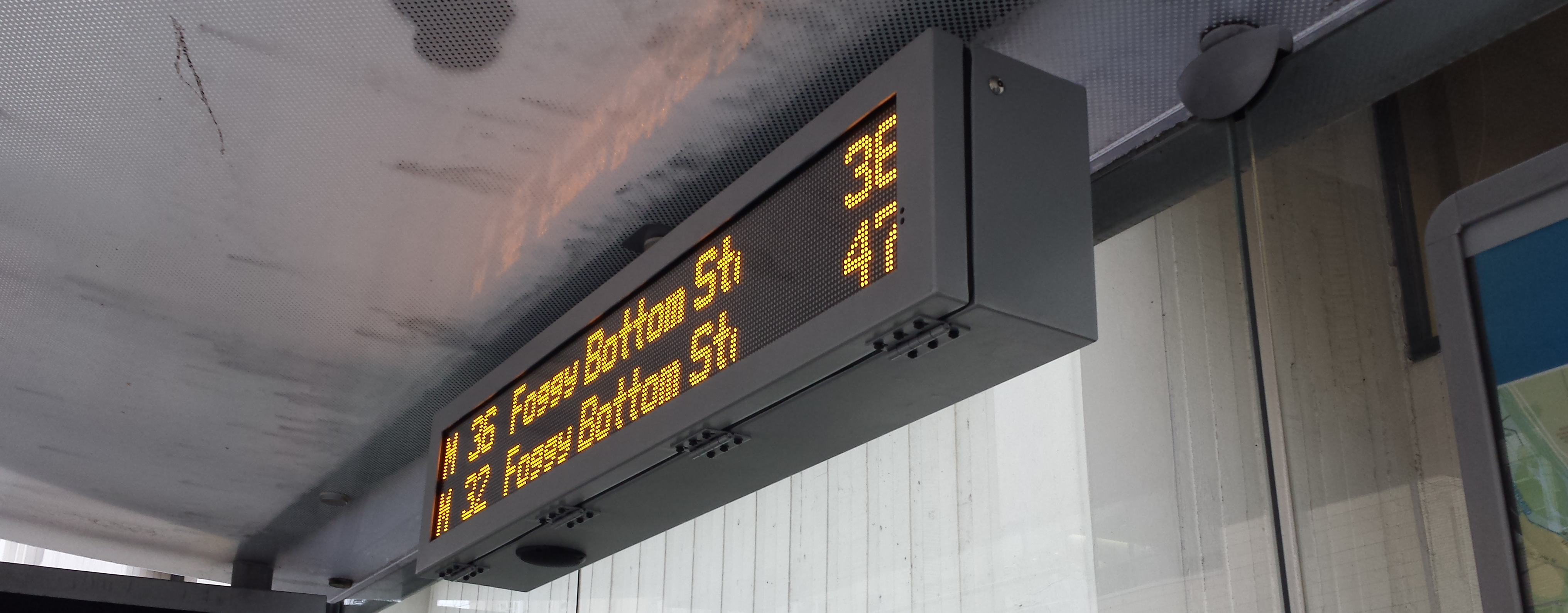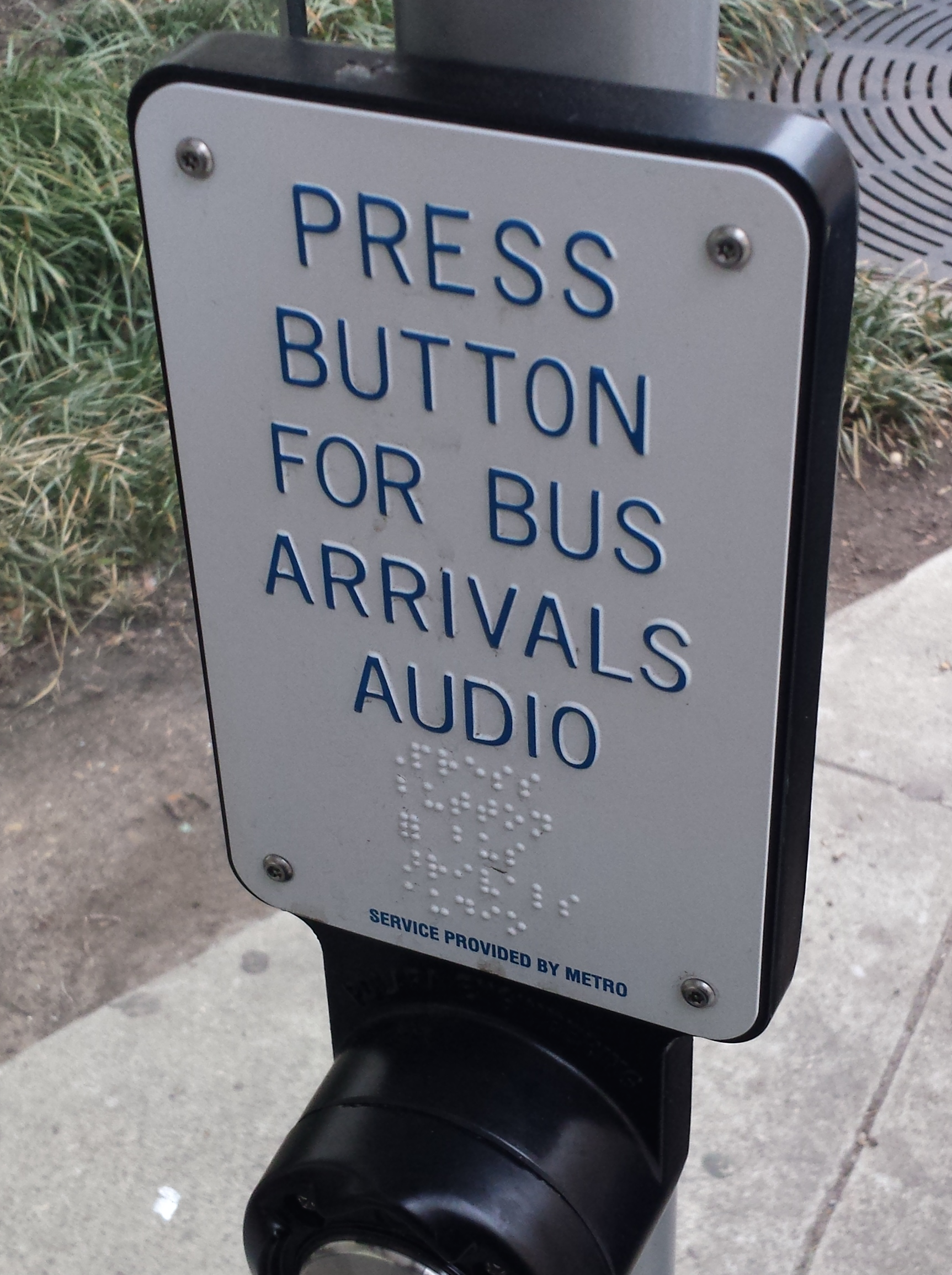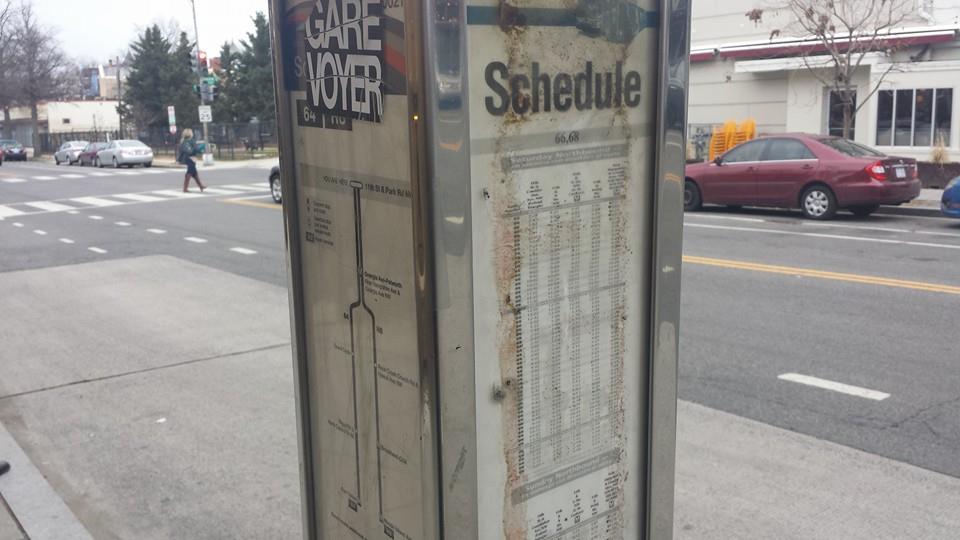When Useful Information Becomes Overwhelming

A bus-arrival time display board was installed recently at a bus stop at 23rd and I streets NW in Washington, D.C.'s Foggy Bottom neighborhood. Michael Grass / GovExec.com
It’s easy to overload the public with information. Here are some questions to ask when considering how to control the faucet.
WASHINGTON — Near the corner of 23rd and I streets NW, opposite the Foggy Bottom-GWU Metrorail station entrance and George Washington University Hospital, a busy bus stop recently got a big tech upgrade.
An electronic display board displaying a rolling sequence of real-time arrival times for bus lines serving the stop was installed last month inside the bus shelter. It’s part of a larger District of Columbia Department of Transportation project funded with stimulus-era federal grants to install more such devices as bus stops across the city.
With each display sign, there’s also an option to activate an automated audio announcement sequence with bus times and destinations.
The technology isn’t new—many cities and transit agencies deployed such display boards years ago—and the data feeds that feed the bus arrival times to the new display boards have been available for many years via smartphone apps, websites and a call center.
Still, it’s a good tool. And access to such real-time information has been shown to improve the public’s satisfaction with transit service.
So the additional piece of streetside public information infrastructure at 23rd and I streets NW is certainly a welcome addition to the busy intersection. (As would prohibiting parking or creating a short bus-only section in the congested northbound lanes of 23rd Street heading toward Washington Circle during the evening rush hour, in case DDOT is reading this.)
But there’s been one problem with the rollout of the bus time display board. It’s one that any state and local government agency can learn from.
The new display board shows bus times up to an hour away. So when you’re standing at the stop at busy commuter times, it can take what seems to be an eternity to roll through the complete feed of bus information.
During the evening rush hour, this stop is served by eight different Metrobus routes, plus suburban commuter buses (which are not displayed on the board), so there’s a lot of real-time information to consume in the sequence.
The funnel-like constraints of the cascade of information limits its usefulness.

When you’re shivering on a cold windy evening at this bus stop, like I was recently, you probably want to know what buses are coming in the next 5 or 10 minutes, not the ones that are 45 or 55 minutes away.
As I’ve waited there on previous evenings waiting to head home, I’ve observed people look at the sign, see that the buses on the display board at that moment are 47 minutes or 52 minutes away, and walk away—when there’s actually a departure a couple minutes away. Instead of being helpful, the deluge of information is counterproductive in terms of attracting riders.

Coupled with the on-demand audio announcements, which can take a few minutes to go through the full sequence, people at the bus stop are bathing in a full array of visual and audio information.
It can be confusing to take in all the information and difficult to tune out—especially if you’re trying to concentrate on some smartphone distraction or just trying to stand at the bus stop in peace.
In a different setting, say a bus stop with service every half hour, having arrival times for buses up to an hour or more away, is probably more helpful. But each access point to information is different and in an ideal world, can be customized for the specific need—in this case, having the ability to shift between bus times that are more immediate or long range.
So here are some questions that local governments or agencies—or more broadly, anyone working in the area of providing public information—should ask themselves.
- How much information is too much for the public to consume at any point of interaction, whether it be with public-space wayfinding, navigation tools, websites, social media, tax documents or agency forms?
- How do you bridge the digital divide as technology evolves and expands? Not everyone has a smartphone and many of those who do can’t always figure out how get public information via apps. Other avenues of access, for those who lack technology or have a mobility, visual, hearing or other impairment issue, have to be available.
- What are the best ways to effectively and clearly communicate important information to audiences across multiple platforms? What is the longevity of that information and does it need to be regularly updated or maintained for quality control purposes?
- As digital information evolves and gives government the ability to be more agile in how it delivers public services and access to information, how do you ensure that more static displays, like signs and websites, stay updated? How do you effectively capture the attention of an increasingly reliant on digital media?
While upgraded bus stops with digital displays are popping up along major routes across Washington, there are plenty of other Metrobus stops with ancient information.

Recently at 11th Street NW and Park Road in the Columbia Heights neighborhood, I came across a bus schedule for the 66 and 68 bus lines, which were discontinued in 2008. But an information panel attached to a sign pole at this intersection included an updated strip-style route diagram of the current service.
Will we still have printed bus schedules in 10 years? If not, when should public transit agencies phase them out? And more specific to this example: Why wasn’t the old print schedule removed when the updated map was added?
If you think an outdated printed bus schedule is a prime example of a public agency failing to properly maintain a piece of public information infrastructure, ask yourself this: How often do you come across a government or public agency website with outdated information, broken hyperlinks, confusing navigation or ancient information layers from a decade ago?
The power of public information and open data is self-evident. It can transform public services. It's a force that helps build and maintain smart government.
But this faucet of information—and the management, quality control and distribution needs that go with it—also presents a big challenge for governments and agencies everywhere.
Michael Grass is Executive Editor of GovExec State & Local.
Photos by Michael Grass






